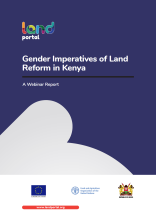Land Library Search
Through our robust search engine, you can search for any item of the over 73,000 highly curated resources in the Land Library.
If you would like to find an overview of what is possible, feel free to peruse the Search Guide.
/ library resources
Showing items 1 through 9 of 21.Women’s land and property rights are increasingly understood as an important driver of economic
growth and social development, as well as being critical to human rights for women. Growing evidence
The National Urban Assessment for Armenia provides a snapshot of the country’s urban sector and offers insights to achieving prosperous and sustainable cities.
After eight years of civil war, parts of Syria are now free from conflict. In recognition of the return to peace, the government officially welcomes back all who fled the country to escape violence.
The GLTN Gender Strategy (2019-2030) provides a framework for designing land tenure and governance interventions around women’s and girls’ land and property rights. It affirms our commitment and motivates our partners to do more to secure land and property rights for women and girls.
The climate crisis demands urgent action, yet we live in a politically polarized and paralyzed world. As governments and other actors struggle over climate change, our environment is irreversibly changing.
We’re pleased to share the Land Portal Foundation's 2018 Annual Report. The report demonstrates how we are working to create a vibrant information ecosystem on land that contributes to better informed decisions and policy making on land throughout the world.
lack of transparency in the land and property sector prevents individuals, communities and governments from unlocking the value of the property as an asset, and undermines policies and legal frameworks that aim to provide land tenure security, potentially leading to a mis
Land registration and titling in Africa are often advocated as a pro-poor legal empowerment strategy. Advocates have put forth different visions of the substantive goals this is to achieve. Some see registration and titling as a way to protect smallholdersrights of access to land.
The webinar on the Gender Imperatives of Land Reforms in Kenya took place on 23 April, 2019.








